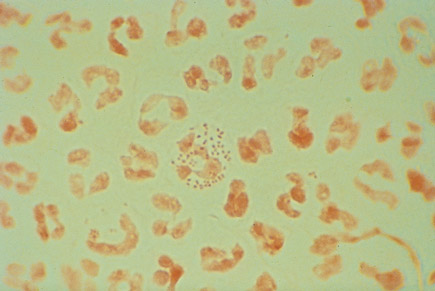MKSAP Quiz: 3-day history of dysuria
A 26-year-old man is admitted to the emergency department with a 3-day history of dysuria with yellow urethral discharge.
On physical examination, temperature is 37.3 °C (99.1 °F), blood pressure is 120/70 mm Hg, pulse rate is 82/min, and respiration rate is 12/min. There are purulent secretions noted at the urethral meatus. No tenderness of the epididymis, spermatic cords, or testes is noted.
A Gram stain of the urethral discharge is shown.

Which of the following is the most appropriate treatment?
A. Azithromycin
B. Cefoxitin
C. Ceftriaxone and azithromycin
D. Ciprofloxacin and azithromycin
Answer and critique
The correct answer is C: Ceftriaxone and azithromycin. This question can be found in MKSAP 16 in the Infectious Disease section, item 83.
The most appropriate treatment is ceftriaxone and azithromycin. This patient presents with symptoms and signs consistent with urethritis, including laboratory findings indicating intracellular gram-negative diplococci visualized on a Gram stain of urethral discharge. If available, Gram stain results are extremely useful in the evaluation of men with symptomatic gonococcal urethritis because more than 95% of patients have this finding. Ceftriaxone is the preferred treatment option. Patients with gonococcal urethritis (or cervicitis) should also be treated for possible chlamydial infection because the risk of coinfection is high. Consequently, a single dose of azithromycin plus ceftriaxone should be given to this patient.
A high (2-g) dose of azithromycin may be sufficient for treating infection with Neisseria gonorrhoeae and also Chlamydia trachomatis but is limited by the high frequency of gastrointestinal side effects, increasing resistance, and expense associated with such use.
Cefoxitin has activity against penicillinase-producing N. gonorrhoeae but would not be effective in a single dose without the simultaneous administration of probenecid. In addition, it would fail to cover possible coinfection with C. trachomatis.
The combination of ciprofloxacin and azithromycin would not be adequate therapy for this patient. Strains of gonorrhea have become increasingly resistant to fluoroquinolones in recent years; consequently, fluoroquinolones such as ciprofloxacin are no longer recommended for treatment of these infections.
Key Point
- Patients with gonococcal urethritis (or cervicitis) should also be treated for possible coinfection with chlamydial infection with ceftriaxone plus a single dose of azithromycin.




